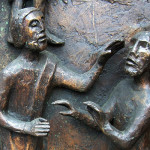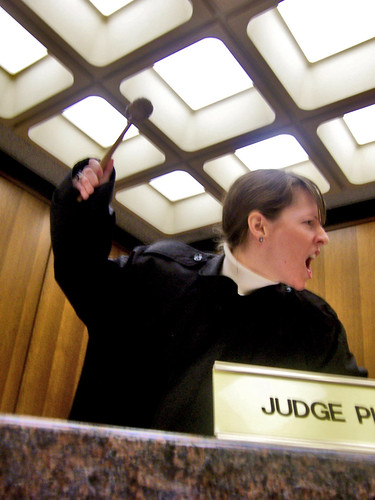We run our website the way we wished the whole internet worked: we provide high quality original content with no ads. We are funded solely by your direct support. Please consider supporting this project.
Court-of-Law Theology: How It Falls Short
Courtney “Coco” Mault via Compfight
Last week, we introduced a way of talking about theology with concentric circles. This approach is distinct from the common Western model of theology that depends upon a court-of-law framework. The following is an excerpt from Greg’s book Benefit of the Doubt regarding this:
____________________________
Within the legal strand of the Western theological tradition, God is viewed primarily as a judge, humans are thought of as guilty defendants, and Jesus is conceived of as a sort of defense attorney. Within this court-of-law framework, the atonement (that is, what Jesus accomplished on the cross) is construed as a sort of legal loophole that our defense lawyer worked out with the judge that somehow gets us off the hook by allowing the father to punish him instead of us. And our salvation, purchased by Jesus’ substitutionary death, is envisioned as an acquittal that allows us to avoid being sentenced by the Judge and consigned to prison (hell) forever.
“What’s wrong with that?” Some readers are undoubtedly wondering? “That’s the very view I was taught!” Well, it’s not entirely wrong. The New Testament does use some legal metaphors in describing God in a relationship with him. For example, God is depicted as a judge. Jesus is once referred to as our advocate before God (1 John 2:1). And the atonement is several times expressed in quasi-legal terms (e.g., Romans 3:25; Hebrews 9:15). At the same time, these legal metaphors are conceived of within a broader and more dominant covenantal context. …
You can see the pervasiveness of the court–of–law paradigm for theology in the sorts of questions Christians tend to ask. For example, I can’t tell you how many times people have asked me to specify exactly what they need to believe in order to be “saved.” Some have seriously wondered if a person who denies biblical inerrancy or who denies the earth was created in six literal days can be “saved.” A religious television personality recently suggested on his show that I was going to hell because I disagree with his interpretation of hell, and I’ve several times heard people suggest that I and anyone else who denied the “penal substitution” interpretation of the atonement were at least likely not saved. And, most disconcerting of all, as our country has become increasingly politically polarized over the last several decades, I’ve encountered more and more people who seriously question the salvation of sisters and brothers in Christ who espouse different political opinions! …
Other questions and concerns Christians commonly raise today reflect the same framework. If I had a quarter for every time I’ve been asked about “eternal security,” for example, I’d be a fairly wealthy man. Can a person lose their salvation? If so, what are the specific conditions for this qualification? What specific sins can cause one to become unsaved? …
The same holds true of the multitude of legal–type questions that I and other pastors regularly get about what exactly constitutes a particular sin. To no one’s surprise, at the top of the list are questions about what technically constitutes “fornication.” How far can a couple go before they’ve “crossed the line”? I’ve met a significant number of unmarried people who have convinced themselves that, so long as a couple stops short of vaginal penetration, they have not technically had “sex.” It took me quite a while to accept that certain unmarried couples were not joking when they would tell me some of the sexually intimate things they do while allegedly avoiding “sex”—some of which would make many married couples blush! But they are serious! This is what happens when people frame their relationship with God in terms of a legal contract. Reasoning like clever lawyers, they assume that if the acquittal-contract doesn’t explicitly close a loophole they’ve uncovered, they have the “right” to take it with impunity. (116-119)
Category: General
Tags: Benefit of the Doubt, Doubt, Faith, Theology
Related Reading

A Rational Defense of Belief in God
The New York Times recently posted a review of Alvin Plantinga’s book, Where the Conflict Really Lies: Science, Religion, and Naturalism. In it, Plantinga argues on philosophical grounds that, among other things, theism is not in conflict with science, that a belief in naturalism along with evolution is contradictory, and that “Faith…is another basic way of forming beliefs, distinct…

Authentic Theology
So much theology does not do justice to the reality of the world. Any theology that’s going to claim to be authentic must be done on the edge of a mass grave of gassed children. If we can’t state our theology there, then it’s useless. We must never block out the pain of this world.…

Why Isn’t God More Clear?
Ever wonder why God isn’t more clear and obvious? Here’s Greg’s take on that question.

Another Sneak Peek from Benefit of the Doubt
As we approach our ReKnew conference next month, we’ll be posting snippets of Greg’s book, Benefit of the Doubt. We hope you’ll be joining us. We extended the deadline for early bird registration. Get on that before Friday at midnight! What Is Your Actual God? In light of all this, what should be said about…

Why Doesn’t God Heal When We Ask?
If we are called to manifest what Jesus manifested and revolt against what Jesus revolted against, and Jesus carried out the kingdom through healing, then why doesn’t God heal those we pray for? One of my personal kingdom heroes is a Vietnamese lady named Dr. Huyen Tranberg. She is a medical doctor who works with…

The Evangelical Heart
qthomasbower via Compfight Rachel Held Evans posted recently about The Scandal of the Evangelical Heart. Citing a comment by John Piper (“It’s right for God to slaughter women and children anytime he pleases. God gives life and he takes life. Everybody who dies, dies because God wills that they die.”) she notes that when we approach the Bible in…

